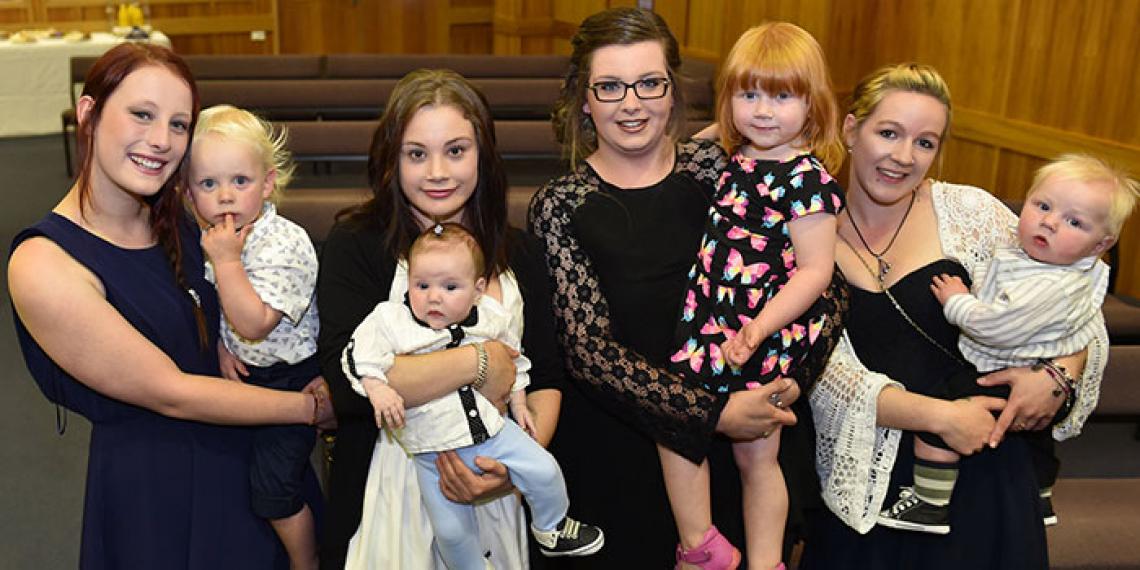You are here
Second chance for a bright future

A graduation and a school formal-style celebration in Dunedin at the end of last year encapsulates the work of E&E and the transformation it makes in people’s lives.
At the close of 2015, a proud group of 10 students in Dunedin celebrated graduating with NCEA Level 2 and 3 after finishing a 40-week Education and Employment (E&E) Youth Guarantee course. The students graduated in early childhood education (ECE), auto trades and service sectors for youth, which covers areas including hospitality and tourism. Other students still taking courses had their achievements to date recognised with a certificate.
Tutors’ assistant Michelle Inwood says the tutors and students went all out to create a fun celebration. They invited the local paper, laid formal tables, the tutors dressed up formally and two tutors took the students to Salvation Army Family Stores to pick out suits and formal wear for the occasion. For many it was their first time dressing up nice, says Michelle.
‘It really helps give them a sense of worth. They went all out for it—glitz and glamour and the makeup. A lot of them came in early and had fish and chips and then got ready at the centre. It created a real buzz as they went in—lots of laughter and lots of panic, a bit like a formal.’
The ECE students had taken on most of the organising for the event, she said. Most of that class were young mothers, who had their children around the age of 16.
Of those who graduated, two have gained scholarships to study at polytech, two are planning to go to university, and the rest are also going to polytech or going into work.
It’s a huge achievement from tutors Sarah Robertson, Iain Davies, Jacqui Walker as well as the students, who come from the five per cent of most high-risk youth in Dunedin, with complex backgrounds and facing huge challenges, Michelle says. Many of the students who arrive at Dunedin E&E every year have been unsuccessful in gaining their NCEA Level 1. Some arrive with drug or alcohol addictions and other struggles.
‘It’s a testing job [for tutors], but it’s so rewarding when you see how they present themselves originally and then see them six months later. Even simple things like someone showering every day who wasn’t. They’re able to hold a conversation and eye contact, their numeracy and literacy skills have gone up, or they’re able to concentrate for 30 minutes instead of five.’
The students invited parents and family to the graduation event. Having their families there was very special for the young people and for the adults, who were moved by the change in the students and their achievements.
‘We were really, really pleased with the amount of family support. It really made it much more special. It helps give them a sense of worth. Some of the parents were saying, “Wow, you’ve done an amazing job!” They seemed excited and energised too—lots of clapping and cheering.’
E&E National Director Gregory Fortuin attended the evening and said it was a special time to celebrate more than just the hard work of staff and students.
‘This is probably the first time in their lives they’re all dressed up on a stage being honoured and respected for not just their achievements, but the human beings that they are. It’s totally emotional for them. Some of the guys’ jackets were slightly big for them, but it didn’t matter. This was just their night.’
The Dunedin students’ story is typical of E&E Youth Guarantee students around the country. The first half of an E&E course is usually spent helping students overcome the challenges of their situation and supporting them to be able to learn. The courses and support of tutors provides the students a foundation to progress in life and the graduations were a special night to celebrate something remarkable, Gregory says.
‘The achievements of these people who have failed or been failed by mainstream education are amazing. Where once they were seen as failures; now, with the right encouragement they’re able to achieve. For me, that makes all the administration, budgets, and paperwork pale into insignificance, when you see genuine transformation and people provided with a pathway to a better life.’
Although E&E staff work with at least 500 young people through Youth Guarantee courses every year, E&E’s work extends much wider than that, all with a focus on transforming lives, Gregory says. It has 15 centres around New Zealand and trains about 1500 people a year, providing education courses and pathways to employment for people who don’t fit in mainstream education. E&E works with released prisoners, refugees, youth and unemployed people looking to get back into work. Courses range from painting, roading, driving and auto trades to hospitality and tourism, early childhood education, and English as a second language.
by Robin Raymond(c) 'War Cry' magazine, 6 February 2016, pp 11.
You can read 'War Cry' at your nearest Salvation Army church or centre, or subscribe through Salvationist Resources.